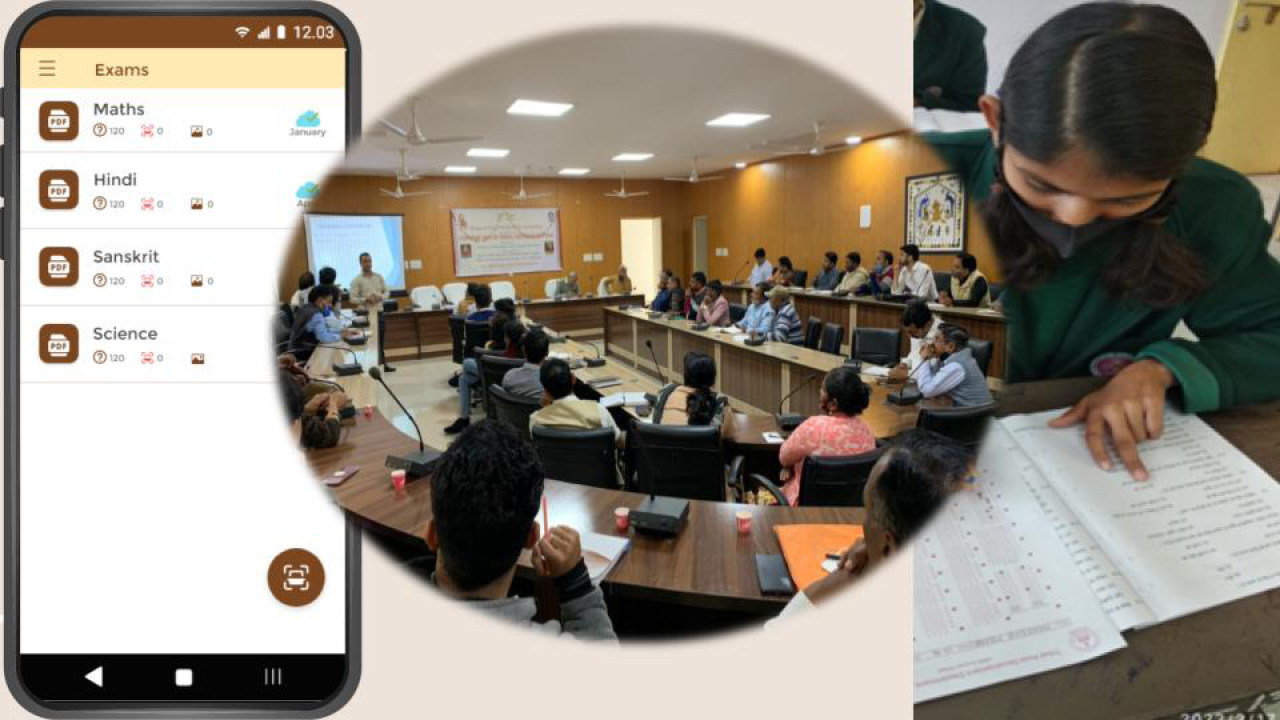Quality Education Programme for Tribal Students Regular Assessment through Edu-Tribe Mobile Application, Government of Rajasthan

Through Edu-Tribe mobile app, students are exposed to regular assessment, immediate feedback and to identify areas that require improvements
Problem
- Inadequate Regular Assessments: Current examination system didn’t promote regular, thorough assessments
- Delayed Results: Evaluation of formal examinations consumed a significant amount of teachers’ time
- Lack of Conceptual Clarity: Students faced challenges in understanding subject content due to infrequent evaluations
Solution
- Edu-Tribe Mobile Application: Developed for instant assessment results and streamlined training for users
- Monthly Course Distribution: Regularised assessment of additional tests led by the Tribal Area Development Department, Udaipur
- Innovative Test Design: Introduction of test booklets with 3 test papers and perforated OMR Sheets for efficient result computation
- Data Analysis for Improved Learning: Instant results provided insights into students’ weak areas, facilitating targeted revision
Outcomes
- Immediate Feedback: Edu-Tribe app enabled teachers to provide students with instantaneous test results
- Improved Conceptual Clarity: Regular assessments and feedback mechanisms helped students to better understand subject content
- Efficient Assessment System: The use of OMR sheets streamlined the examination process, making it time-efficient
- Replicable Model: Due to its success, there are proposals to replicate the system for classes 6th to 8th
Project Details
Category: Mobile App for Assessment of Tribal Students
Project: Quality Education Programme for Tribal Students Regular Assessment through Edu-Tribe Mobile Application
Organisation: Tribal Area Development Department, Udaipur, Government of Rajasthan
Start Date: 01-July-2021
Problem
The Tribal Area Development Department, responsible for 45 residential schools and 471 hostels, with a total enrolment of 22,900 students, recognized a critical challenge in ensuring quality education: the lack of regular and effective assessments. Current practices, which involved three tests, half-yearly and annual examinations, organised by the Education Department Rajasthan, lacked efficiency. This traditional approach led to prolonged result times, leaving students with limited conceptual clarity and delayed feedback on their performance. Additionally, there were no provisions for consistent assessments under the department’s direction.
Solution
To bridge the gap in the educational system, the Tribal Area Development Department, Udaipur, initiated a series of innovative solutions. The keystone of this initiative was the Edu-Tribe mobile application, designed to provide immediate assessment results. To further strengthen the teaching-learning process, monthly course distributions were established, paired with regular assessments. Question papers were innovatively designed to contain three tests with perforated OMR Sheets. By standardizing a common timetable for these tests and utilising OMR Sheets for answers, results were generated instantly, freeing teachers from prolonged evaluation processes. Furthermore, cloud-based data analysis enabled the identification of weak subject areas at both the student and state level, thereby guiding revision strategies.
Outcomes
The introduction of the Edu-Tribe mobile application and the new assessment strategies have brought about transformative outcomes. Students, now exposed to regular assessments, receive immediate feedback, allowing them to identify and address areas of weakness promptly. This has also enhanced their conceptual understanding, leading to improved performance. The teachers benefit from a streamlined and efficient assessment process, moving away from the traditional, time-consuming methods. This approach, besides benefiting the current students, has proven so effective that there’s a consideration to extend this model to younger classes, specifically 6th to 8th, showcasing its potential as a replicable model for broader educational systems. Three Question Papers in each booklet with 3 perforated OMR Sheets. 5 subject papers for class 11th & 12th and 6 subject papers for 9th and 10th students used out of 22,900 Students. 1.62 lakh booklets were printed with 4.86 lakh OMR sheets.

